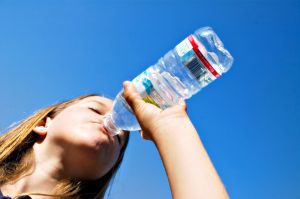We all know that water is essential for our everyday survival, and the effects of dehydration and water loss are well-documented. We are told to drink loads of water each day, but how much water should you drink a day? Is there a formula or magic number to ensure we stay hydrated, and is it best to get all the water into our bodies as quickly as possible, or regulate our water intake for the day?

Why Daily Hydration Matters and the Benefits of Drinking Water
Maintaining proper hydration supports your overall health. Water plays a vital role in regulating body temperature, supporting kidney function, aiding digestion, and flushing out waste through urine. Inadequate fluid intake can affect your water balance and lead to health conditions like kidney stones, urinary tract infections, and fatigue.
While many beverages and foods contain water—especially fruits and vegetables—plain water remains the best choice for hydration. Drinking water regularly can help with weight management, skin health, and energy levels. For older adults, staying hydrated is especially important, as the sense of thirst can diminish with age.
How Much Water Do You Need to Drink Every Day?
The amount of water you need depends on your body weight, activity level, climate, and health conditions. A general guideline is about 15.5 cups (3.7 liters) of fluids per day for men and 11.5 cups (2.7 liters) for women. Around 20% of daily fluid intake typically comes from food, so most of your hydration should still come from beverages—especially plain water.
People may need more water per day if they’re physically active, live in hot or cold environments, or are dealing with illnesses like fever or diabetes, which increase fluid loss. The colour of your urine can be a helpful sign—clear or pale yellow usually indicates proper hydration.
Understanding Fluid Needs and Your Recommended Daily Water Intake
A common rule of thumb is to aim for eight glasses of water a day, but this should be adjusted based on lifestyle. Add an extra glass for every 30 minutes of physical activity, and more during hot or cold weather. If you’re doing chores or moving around a lot during the day, that increases your need for water, too.
Caffeinated drinks like coffee and tea, while popular, can have a mild diuretic effect, especially in large amounts. That means they may lead to more frequent urination and fluid loss. Beverages with added sugar, such as sodas and fruit juices, not only contribute to dehydration but also increase your sugar intake—500ml of cola can contain the equivalent of 17 sugar cubes, which impacts both hydration and weight.
Tips to Stay Hydrated and Make Sure You Drink Enough Water
To stay healthy and hydrated, prioritise plain water throughout the day. Spread your intake evenly, rather than drinking a large amount all at once. Taking regular trips to the water cooler to fill up your water bottle, setting reminders, or pairing water with meals are simple ways to keep your fluid intake steady.
Be cautious not to drink too much water in a short period, as this can lead to a rare but serious condition called hyponatremia, where sodium levels in the blood become dangerously low. Also, for people with health conditions like kidney issues or heart problems, fluid intake should be monitored and discussed with a healthcare provider.
Ultimately, hydration needs are individual. Listen to your body, adjust for your environment and activity level, and drink enough water to replenish what your body loses throughout the day. Looking for reliable hydration solutions? Contact AquAid for water coolers and water solutions tailored to your needs. Stay refreshed, stay hydrated.
